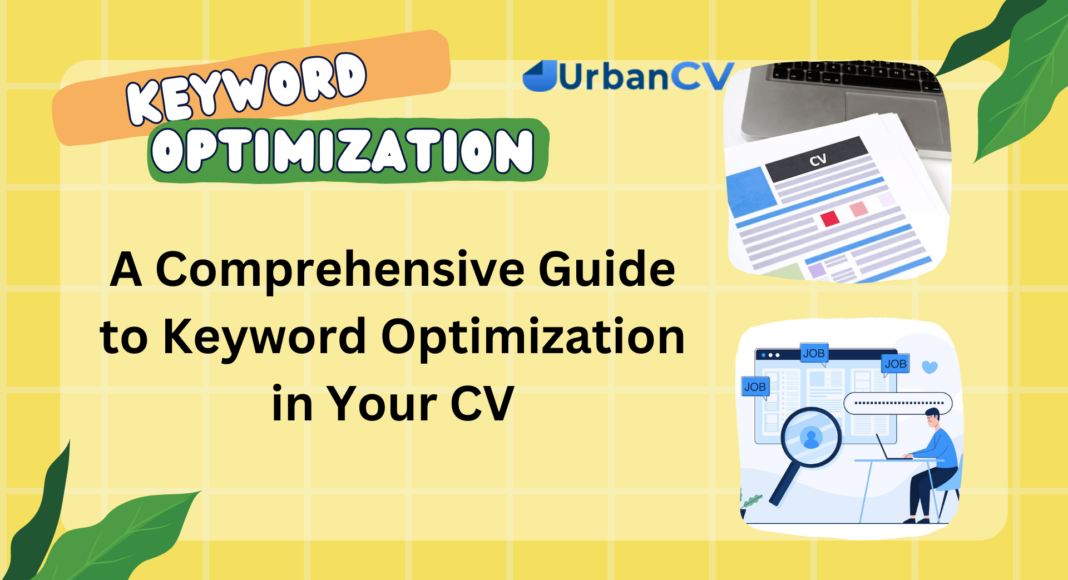Key Takeaways
- Strategic Precision: Learn to strategically infuse industry-specific keywords into your CV, enhancing visibility with ATS and captivating recruiters.
- Continuous Refinement: Embrace regular updates, seek feedback, and adapt to evolving trends for a perpetually optimized and competitive CV.
- Holistic Impact: From impactful action verbs to quantifiable achievements, discover how a nuanced keyword strategy creates a compelling professional narrative, propelling you toward career success.
In today’s competitive job market, where recruiters rely heavily on Applicant Tracking Systems (ATS) to sift through countless resumes, the strategic use of keywords in your CV can make all the difference in landing your dream job.
This comprehensive guide is designed to demystify the intricate art of keyword optimization, providing valuable insights and practical strategies to ensure your CV stands out amidst the sea of applications.
From understanding the pivotal role of ATS to identifying and placing the right keywords, we embark on a journey to enhance your employability through thoughtful and targeted CV optimization.

The ATS Advantage: Navigating the Recruitment Landscape
As technology continues to reshape the hiring process, it is imperative to grasp the significance of Applicant Tracking Systems.
This section delves into the inner workings of ATS, explaining how these automated systems filter resumes and why incorporating the right keywords is crucial for making it past the initial screening stages.
Gain insights into how ATS interprets and prioritizes keywords, empowering you to tailor your CV effectively for maximum visibility and impact.
Decoding Relevance: Identifying the Right Keywords
Embark on a journey of self-discovery as we explore the art of identifying relevant keywords for your CV.
Analyzing job descriptions, understanding industry-specific terminology, and showcasing your skills and qualifications are integral components of this process.
Uncover the secrets of aligning your CV with the language of your desired industry, ensuring that your application resonates with recruiters and speaks the language of success.
Strategic Placement: Elevating Your CV with Keyword Precision
Once armed with the right keywords, the next challenge is strategically placing them throughout your CV.
In this segment, we navigate through the core sections of your resume, unveiling the art of keyword integration in the professional summary, work experience, skills section, and education.
Learn how to strike the perfect balance between showcasing your strengths and seamlessly incorporating keywords to captivate both ATS and human recruiters alike.
Continue reading, and let this guide be your compass on the journey to crafting a keyword-optimized CV that not only beats the algorithms but also resonates with hiring managers, propelling you closer to the career opportunities you aspire to achieve.
Before we venture further into this article, we like to share who we are and what we do.
About UrbanCV
UrbanCV is a business tech startup based in Singapore, with a strong presence all over the world.
With over six years of recruiting, and hiring and being one of the top leaders in the HR industry, plus being highly involved in helping millions of job seekers find their dream jobs and internships, the UrbanCV team has listed some important learning points in this overview of the guide on keyword optimization in your CV.
If you are looking for a high-salaried job or an exciting internship, then try our partner job portal at 9cv9, which is the world’s leading job portal and HRtech company.
A Comprehensive Guide to Keyword Optimization in Your CV
- Understanding Applicant Tracking Systems (ATS)
- Identifying Relevant Keywords
- Placement of Keywords in Your CV
- Avoiding Keyword Stuffing
- Tailoring Your CV for Each Job Application
- Keeping Up with Industry Trends
- Final Tips for Effective Keyword Optimization
1. Understanding Applicant Tracking Systems (ATS)
In today’s digitized job market, Applicant Tracking Systems (ATS) play a pivotal role in streamlining the recruitment process for employers and recruiters.
By comprehending the nuances of ATS, job seekers can strategically optimize their CVs to increase the likelihood of making it through initial screening processes and securing coveted interviews.

The ATS Blueprint: Decoding Automated Hiring
Applicant Tracking Systems are sophisticated software applications designed to automate the initial stages of the hiring process.
These systems assist employers in managing, sorting, and filtering a large volume of resumes, enabling them to identify candidates who closely match specific job requirements.
75% of recruiters use an ATS or another tech-driven recruiting tool to review applicants and strengthen the overall candidate experience, emphasizing the widespread adoption of this technology in today’s corporate landscape.
How ATS Interprets Keywords: The Gatekeepers of CV Screening
Keywords are the currency of the ATS realm, acting as the primary determinants of whether your CV progresses to the next stage or gets relegated to the digital abyss.
ATS scans resumes for relevant keywords, seeking to match the skills and qualifications outlined in job descriptions.
Example: Unveiling the Keyword Dance
Consider a job posting in the IT sector seeking a candidate with proficiency in programming languages such as Python, Java, and C++.
To align with the ATS screening, a candidate’s CV must strategically integrate these specific keywords in relevant sections.
Failure to do so may result in the ATS overlooking an otherwise qualified candidate, highlighting the critical role of precise keyword placement.
Crafting ATS-Friendly Resumes: Strategies for Success
To navigate the ATS landscape successfully, job seekers must adopt proactive strategies to ensure their resumes pass through automated screening unscathed.
Tailor Your CV for Each Application
ATS algorithms are designed to detect tailored resumes that directly align with job descriptions.
Utilize keywords from the job posting to customize your CV for each application, increasing the likelihood of passing through the initial screening process.
Optimize Your Professional Summary
Place essential keywords strategically in your professional summary, providing a snapshot of your skills and qualifications.
This section serves as a crucial ATS entry point, capturing the system’s attention and encouraging further exploration of your CV.
Use Standard Fonts and Formats
Simplify your CV format to ensure easy parsing by ATS algorithms. Stick to standard fonts and avoid intricate designs that might confuse the system, ensuring seamless processing of your application.
Mirror Language from Job Descriptions
Incorporate industry-specific terminology and mirror language used in job descriptions. This not only enhances your CV’s relevance but also resonates with both ATS and human recruiters.
2. Identifying Relevant Keywords
To craft a CV that speaks the language of recruiters and Applicant Tracking Systems (ATS), a fundamental step is identifying and incorporating relevant keywords.
This section delves into strategic methods to uncover the keywords that align with your target job and industry.

Analyzing Job Descriptions: A Goldmine of Keywords
Job descriptions serve as treasure troves for keywords, offering valuable insights into the specific skills and qualifications sought by employers.
Thus, decoding job descriptions is pivotal for identifying the keywords that resonate with recruiters and ATS alike.
Example: Decoding a Marketing Job Description
Consider a marketing job description that emphasizes skills such as SEO, social media management, and content creation.
Extract relevant keywords like “SEO specialist,” “social media strategist,” and “content marketer” to tailor your CV effectively for such a role.
Industry-Specific Keywords: Navigating Professional Lexicons
Every industry possesses its unique lexicon, and incorporating industry-specific keywords is paramount for showcasing your expertise.
Utilize resources such as industry publications, forums, and association websites to identify the terminology that resonates with professionals in your field.
Example: Technology Sector Jargon
In the technology sector, keywords like “machine learning,” “cloud computing,” and “agile development” hold significant weight.
Integrating these terms not only showcases your familiarity with industry trends but also enhances your CV’s searchability for ATS algorithms.
Skills and Qualifications: Showcasing Your Proficiency
Beyond job descriptions, emphasizing your skills and qualifications is a strategic approach to identifying relevant keywords.
Utilize a skills section in your CV to highlight both hard and soft skills, ensuring a comprehensive representation of your capabilities.
Example: Highlighting Technical Skills
For a software developer position, essential technical keywords may include “programming languages” (e.g., Java, Python), “software development methodologies” (e.g., Agile, Scrum), and “version control systems” (e.g., Git).
Quantifying the Impact: Incorporating Quantifiable Achievements
Incorporating quantifiable achievements not only adds substance to your CV but also introduces keywords that showcase your tangible contributions. Numbers and statistics can significantly enhance the relevance of your CV.
Example: Demonstrating Sales Success
Rather than a generic statement, quantify your achievements, such as “Increased sales revenue by 30% within the first quarter,” thereby incorporating keywords like “sales revenue increase” and “business growth” into your CV.
3. Placement of Keywords in Your CV
Optimizing your CV for success involves more than just identifying relevant keywords—it’s equally crucial to strategically place them throughout your document.
In this section, we explore the core sections of a CV, revealing the art of keyword placement for maximum impact.

Strategic Keyword Placement: A Roadmap for Success
Strategically placing keywords in your CV involves a thoughtful approach that ensures visibility to both Applicant Tracking Systems (ATS) and human recruiters.
By incorporating keywords seamlessly into key sections, you enhance your chances of standing out in a competitive job market.
Example: Elevating Your Professional Summary
Your professional summary serves as the first impression in your CV, making it an ideal space to incorporate essential keywords.
For instance, if you are a project manager seeking roles in Agile environments, your professional summary might include phrases like “results-driven project manager with expertise in Agile methodologies.”
Core Sections for Keyword Inclusion: Unlocking the Full Potential
To maximize the impact of keywords, it’s essential to integrate them into the core sections of your CV, providing a comprehensive overview of your skills and experiences.
Work Experience: Showcasing Proficiency
In the work experience section, strategically integrate keywords relevant to each position held.
Use specific examples to demonstrate your proficiency, such as “Led a cross-functional team in implementing SEO strategies, resulting in a 20% increase in website traffic.”
Skills Section: A Keyword Repository
Dedicate a distinct skills section to emphasize both hard and soft skills. This allows for a concentrated display of keywords, making it convenient for recruiters and ATS to identify your core competencies.
Example: Technical Skills Showcase
For a software developer, the skills section might include keywords like “programming languages” (e.g., Java, Python), “web development frameworks” (e.g., Django, React), and “database management” (e.g., MySQL, MongoDB).
Education: Reinforcing Credentials
Incorporate relevant keywords in the education section, especially if specific courses, certifications, or academic achievements align with the job requirements.
For instance, a marketing professional might highlight coursework in “Digital Marketing Strategies” to complement keywords in their CV.
Avoiding Keyword Stuffing: Maintaining a Delicate Balance
While strategic keyword placement is vital, it’s equally important to avoid keyword stuffing—a practice that can negatively impact both ATS and human readability.
Balancing Keyword Density
Maintain a natural flow in your CV by balancing keyword density. Aim for a keyword frequency that emphasizes your qualifications without compromising the overall coherence and readability of the document.
Example: Achieving Balance in Context
Instead of repetitively using the same keyword, vary your language while maintaining relevance.
For instance, interchange terms like “project management” with “project leadership” to demonstrate versatility without sacrificing keyword alignment.
4. Avoiding Keyword Stuffing
In the quest for an optimized CV, the importance of keywords cannot be overstated.
However, a pitfall to avoid is keyword stuffing—a practice that can hinder your chances with both Applicant Tracking Systems (ATS) and human recruiters.
This section delves into the nuances of striking the right balance, ensuring your CV remains a polished and engaging document.

Balancing Keyword Density: A Delicate Art
Achieving the perfect keyword density in your CV is essential. While keywords enhance your visibility to ATS, stuffing your document with excessive terms can lead to rejection or disengagement from human readers.
Maintaining a Natural Flow
Craft sentences that seamlessly integrate keywords without sacrificing the natural flow of your writing.
For instance, instead of repetitively using “project management skills,” diversify your language by incorporating variations like “project leadership abilities” or “proficient in project management.”
Example: Striking the Right Balance
In a marketing CV, instead of crowding your skills section with repetitive instances of “SEO,” “Search Engine Optimization,” and “optimizing for search engines,” streamline your language to showcase versatility: “Expert in SEO strategies for optimizing online content.”
ATS Perception of Keyword Density: Cracking the Algorithm Code
Understanding how ATS algorithms perceive keyword density is crucial. Striking a balance ensures your CV not only passes through automated screenings but also maintains readability for human reviewers.
The Human Factor: Appealing to Human Recruiters
Beyond ATS, your CV is ultimately read by human recruiters who value clarity, coherence, and engaging content. Avoiding keyword stuffing ensures your document resonates with these decision-makers.
Ensuring Readability and Coherence
A CV cluttered with keywords can be challenging for human readers to navigate. Maintain readability by organizing information coherently, making it easy for recruiters to extract key details.
Example: Crafting a Readable CV
In a sales-oriented CV, instead of inundating your achievements with numerous instances of “sales,” consider blending related terms like “revenue generation,” “client acquisition,” and “business development” to maintain a readable and impactful narrative.
ATS Blacklists: The Consequences of Overstuffing
Excessive keyword usage can trigger ATS blacklists, marking your CV as spam or irrelevant. Understanding the repercussions emphasizes the importance of a balanced approach.
Avoiding ATS Rejection
ATS blacklists often result in automatic rejection.
Keyword Synonyms: Enhancing Versatility
Instead of repetitively using the same keywords, incorporate synonyms to add depth and versatility to your CV. This not only prevents stuffing but also showcases your adaptability.
Example: Synonyms in Action
In a finance-focused CV, instead of solely emphasizing “financial analysis,” diversify your language with synonyms like “financial evaluation,” “economic appraisal,” or “budgetary analysis.”
5. Tailoring Your CV for Each Job Application
In the dynamic landscape of job applications, a one-size-fits-all approach to CVs falls short.
Tailoring your CV for each job application is a strategic imperative, aligning your skills and experiences with the unique requirements of each position.
This comprehensive guide delves into the art and science of crafting a targeted CV that stands out in the eyes of both Applicant Tracking Systems (ATS) and discerning human recruiters.

The Customization Imperative: Unleashing the Power of Relevance
Tailoring your CV for each job application is more than a recommendation; it’s a necessity in a competitive job market where personalization can be the differentiator between success and rejection.
Example: Job-Specific Tailoring in Action
Consider a candidate applying for two distinct roles—one in marketing and another in project management.
By customizing the CV for the marketing position to highlight skills like “digital marketing” and “content creation” and adjusting the project management CV to emphasize “project planning” and “team coordination,” the candidate optimizes their chances for success in each application.
Understanding Job Requirements: Decoding the Blueprint
Before embarking on the customization journey, a thorough understanding of the specific job requirements is paramount. Analyze the job description, identifying keywords, skills, and qualifications sought by the employer.
Keyword Alignment
Tailoring your CV to include these keywords significantly enhances your ATS compatibility.
Example: Aligning with Job Descriptions
If a job description emphasizes “customer relationship management,” ensure your CV mirrors this language.
Tailor your achievements and experiences to showcase instances where you’ve excelled in customer relationship management, enhancing your alignment with the job requirements.
Customizing Your Professional Summary: The First Impression Matters
Your professional summary is the gateway to your CV, and tailoring it for each job application ensures that it resonates with the specific needs of the employer.
Crafting a Targeted Professional Summary
Tailor your professional summary to highlight skills and experiences most relevant to the job at hand.
For instance, if the role prioritizes “leadership in cross-functional teams,” your professional summary could showcase your prowess in “collaborative leadership” and “team integration.”
Example: Dynamic Professional Summaries
For a sales position, emphasize your expertise in “driving revenue growth” and “developing client relationships.” Conversely, for a data analyst role, focus on “data-driven decision-making” and “statistical analysis.”
Showcasing Relevant Achievements: Putting Your Best Foot Forward
Every job application is an opportunity to highlight achievements that directly align with the expectations of the prospective employer. Tailoring this section amplifies the impact of your CV.
Quantifiable Achievements
Tailoring your CV to include specific, quantifiable achievements can significantly enhance your appeal.
Example: Targeted Achievements
Tailor your achievements to match the desired outcomes of the role. If a position emphasizes “increasing sales revenue,” quantify your impact by stating “Achieved a 25% increase in sales revenue within the first quarter.”
6. Keeping Up with Industry Trends
In the ever-evolving landscape of job markets, staying abreast of industry trends is crucial for career success.
This comprehensive guide explores the significance of keeping up with industry trends, providing actionable insights and examples to help professionals remain competitive and sought-after in their respective fields.

The Dynamic Nature of Industries: Why Trend Awareness Matters
Industries are dynamic entities, subject to constant change and innovation.
Staying informed about emerging trends positions professionals as valuable assets to employers, showcasing adaptability and a proactive approach to their careers.
The Speed of Change: A Data-Driven Perspective
Remaining stagnant in the face of such changes could render skills obsolete.
Example: Technological Disruption in Finance
In the finance sector, the rise of fintech and blockchain technologies is reshaping traditional banking processes.
Professionals who adapt and acquire knowledge in areas such as cryptocurrency and digital banking are better poised for career growth.
Adapting to Job Market Demands: Aligning Skills with Trends
Industries prioritize professionals who possess skills aligned with current trends. Adapting to job market demands by acquiring and showcasing these skills enhances employability and opens doors to new opportunities.
The Skills Gap Challenge: A Global Phenomenon
Professionals who bridge this gap by acquiring in-demand skills position themselves as indispensable assets in the job market.
Example: Embracing Data Science in Healthcare
In the healthcare sector, the integration of data science is a burgeoning trend.
Professionals who invest in learning data analytics or healthcare informatics are not only meeting industry demands but also contributing to enhanced patient care through data-driven insights.
Staying Informed About Industry Jargon: Language Matters
A profound understanding of industry-specific jargon and terminology is a hallmark of an informed professional. It not only facilitates effective communication but also demonstrates a commitment to staying current in the field.
Industry-Specific Vocabulary: Navigating Professional Conversations
This underscores the importance of incorporating relevant jargon into professional communication.
Example: Mastering Renewable Energy Lingo
In the renewable energy sector, terms like “solar photovoltaics,” “wind turbine efficiency,” and “smart grids” are integral to discussions.
Professionals who seamlessly incorporate such language demonstrate a deep understanding of the industry’s nuances.
The Impact of Continuous Learning: Professional Development Strategies
Embracing continuous learning is a cornerstone of staying informed about industry trends.
Professionals who actively pursue educational opportunities, certifications, and workshops are better positioned for career advancement.
Online Learning Platforms: A Gateway to Knowledge
Platforms like Coursera, Udacity, and LinkedIn Learning offer a plethora of courses on emerging industry trends.
Example: Gaining Edge with Blockchain Certification
In the tech industry, professionals keen on blockchain technology can pursue certifications from platforms like IBM Blockchain or B9lab.
This not only enhances their understanding but also signals to employers a commitment to staying at the forefront of technological advancements.
Networking and Industry Events: Building Strategic Connections
Active participation in industry events, conferences, and networking opportunities is a proactive strategy for staying informed and connected.
These forums provide a platform to discuss trends, share insights, and build valuable professional connections.
Conferences and Seminars: Immersive Learning Experiences
Industry-specific conferences and seminars offer deep dives into current trends.
Attending events like the Consumer Electronics Show (CES) for tech enthusiasts or the World Economic Forum for global leaders provides exposure to cutting-edge innovations.
Example: AI Enthusiasts at the AI Summit
For professionals in artificial intelligence, attending the AI Summit provides exposure to the latest advancements, networking with industry leaders, and gaining insights into the future trajectory of AI applications across sectors.
7. Final Tips for Effective Keyword Optimization
Keyword optimization is a nuanced art that requires precision and strategy, especially in the competitive realm of CV crafting.
This section offers comprehensive tips, backed by data and examples, to ensure your keyword optimization efforts not only align with the requirements of Applicant Tracking Systems (ATS) but also resonate with human recruiters.

Regular CV Review and Update: A Continuous Optimization Cycle
Maintaining an updated and relevant CV is an ongoing process. Regularly reviewing and updating your document ensures that it remains in sync with evolving industry trends and job market demands.
Industry Dynamics Demand Regular Updates
Industries evolve, and so should your CV.
Example: Tech Professionals and Swift Industry Changes
In the tech sector, skills and technologies rapidly become outdated. Regularly updating your CV to include the latest programming languages, frameworks, or methodologies ensures you remain relevant and competitive.
Seek Feedback from Peers and Professionals: External Perspectives Matter
Gaining insights from others can provide valuable perspectives on the effectiveness of your keyword optimization. Seek feedback from peers, mentors, or industry professionals to refine and enhance your CV.
Example: Improving CV Clarity Through Peer Review
If your peers find certain sections confusing or feel that specific keywords could be better emphasized, their feedback can guide you in refining your CV for better clarity and impact.
Utilize Action Verbs for Impactful Descriptions: Painting a Vivid Professional Picture
Opt for powerful action verbs to convey your achievements and experiences vividly. These verbs not only captivate the reader’s attention but also align with the dynamic language preferred by ATS.
The Influence of Action Verbs on Impressions
Action verbs help to create an impact when you’re delivering information to another reader.
Example: Transformative Action Verbs
Instead of stating, “Managed a team,” opt for more impactful verbs like “orchestrated,” “led,” or “guided.” This not only conveys leadership skills but also enhances the overall impression of your managerial capabilities.
Incorporate Numbers and Metrics: Quantify Achievements for Precision
Numbers and metrics add substance to your CV, providing tangible evidence of your accomplishments.
Quantifying achievements not only captures attention but also facilitates a more objective evaluation of your capabilities.
Example: Enhancing Sales Achievements
Instead of a generic statement like “Increased sales revenue,” specify the percentage increase, such as “Boosted sales revenue by 25% within the first quarter,” providing a clear and measurable impact.
Embrace Industry Keywords Beyond Job Descriptions: Expand Your Lexicon
While job descriptions provide a foundational set of keywords, expanding your lexicon with industry-related terms and buzzwords enhances the depth and relevance of your CV.
Example: Inclusive Technology Terms for IT Professionals
For an IT professional, including terms like “cloud computing,” “cybersecurity protocols,” or “agile development methodologies” showcases a holistic understanding of the industry beyond the immediate job description.
Craft a Compelling Story: Align Keywords with Your Professional Narrative
Your CV is not just a compilation of keywords; it’s a narrative that tells your professional story. Align keywords with your narrative to create a compelling and cohesive document.
Example: Aligning Keywords with Career Progression
If your career trajectory involves a transition from project coordination to project management, ensure that your CV reflects this progression by incorporating relevant keywords like “project leadership” and “strategic planning.”
Conclusion
In the labyrinth of job applications, where every keyword can be the key to unlocking career opportunities, mastering the art of keyword optimization in your CV becomes a strategic imperative.
This comprehensive guide has navigated the intricate landscape of CV crafting, unraveling the nuances, and providing actionable insights to propel your professional narrative to new heights.
The Importance of Precision in CV Optimization
As industries evolve at an unprecedented pace, the significance of precision in CV optimization cannot be overstated.
We’ve explored the dynamic nature of industries, where staying current isn’t just a choice but a career imperative.
The speed of change, fueled by technological advancements, demands a meticulous approach to keyword selection and incorporation.
Strategic Alignment with Job Market Demands
Aligning your skills with the demands of the job market emerges as a pivotal strategy.
Our exploration into adapting to job market demands has shed light on the global skills gap challenge, emphasizing the need for professionals to stay ahead by acquiring and showcasing in-demand skills.
The examples provided illustrate how professionals can strategically align themselves with industry needs, ensuring their CVs remain compelling and relevant.
Navigating Industry-Specific Language for Effective Communication
In the realm of effective communication, mastering industry-specific language becomes a potent tool.
The statistics presented underline the impact of industry jargon on employer preferences.
By delving into the examples, we’ve witnessed how professionals can navigate industry-specific language to communicate their expertise fluently and authentically.
Continuous Learning as the Cornerstone of Professional Growth
Continuous learning emerges as a cornerstone for professional growth.
The insights into online learning platforms, certification opportunities, and the impact of upskilling on career success highlight the transformative power of education.
The examples provided showcase how embracing continuous learning can be a dynamic force, propelling professionals toward the forefront of their industries.
Strategic Networking and Industry Engagement
The section on networking and industry events reinforces the idea that success is often cultivated in collaboration.
Examples such as attending conferences and engaging with peers underscore the value of building strategic connections and staying informed through immersive experiences.
Networking not only opens doors to opportunities but also fosters a community where professionals can exchange insights and trends.
Final Tips for Effective Keyword Optimization
The culmination of this guide offers final tips for effective keyword optimization, providing a holistic view of the intricacies involved in crafting a compelling CV.
The data-backed insights, statistical revelations, and real-world examples underscore the importance of continuous review, external feedback, impactful language use, quantifiable achievements, and crafting a compelling narrative for a standout CV.
If you find this article useful, why not share it with your friends and also leave a nice comment below?
We, at the UrbanCV Research Team, strive to bring the latest and most meaningful CV data, Resume guides, and CV statistics to your doorstep.
To get access to top-quality Resumes, CVs, and Cover Letter guides, click over to the UrbanCV Blog.
If you are keen to find your next job or internship, then click on 9cv9 Job Portal now.
People also ask
What is keyword optimization in a resume?
Keyword optimization in a resume involves strategically incorporating industry-specific terms and skills relevant to the job. This ensures compatibility with Applicant Tracking Systems (ATS) and enhances visibility, increasing the likelihood of the resume being noticed by recruiters.
How do you add keywords to your CV?
Add keywords to your CV by carefully reviewing the job description, identifying relevant skills and terms. Incorporate them naturally into sections like the professional summary, skills, and work experience. Ensure a balance between ATS compatibility and human readability for an effective CV.
How do I optimize my CV?
Optimize your CV by tailoring it for each job, incorporating industry-specific keywords, showcasing quantifiable achievements, and maintaining a clean, readable format. Regularly update it to align with evolving trends and seek feedback for continuous improvement.
















